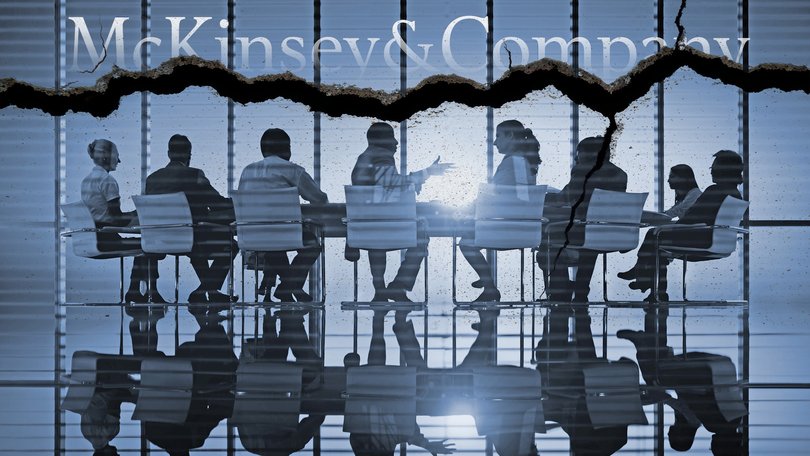THE ECONOMIST: Consultancy giant McKinsey shrinks as rivals and Artificial Intelligence gain ground
THE ECONOMIST: How did the legendary consultancy firm, which turns 100 next year, lose its edge?

“Business has been forced to adjust itself to staggering acceleration in the rate of change,” observed McKinsey, a consultancy, in a promotional pamphlet it published in 1940. “What period in history has ever presented more difficult problems for the executive?” Naturally, demand for McKinsey’s advice was soaring, it wrote.
These too are times of upheaval. Geopolitics is forcing companies to rethink where and how they operate. Artificial intelligence (AI) is filling bosses with excitement at the opportunity to replace costly humans with bots — and fear that their business models may be disrupted. And yet McKinsey, the most illustrious of consultancies, finds itself in the doldrums.
McKinsey has long regarded itself as operating in a league of its own. Ron Daniel, its boss from 1976 to 1988, talked of an “organisation of genuine greatness” filled with “superior people”.
Sign up to The Nightly's newsletters.
Get the first look at the digital newspaper, curated daily stories and breaking headlines delivered to your inbox.
By continuing you agree to our Terms and Privacy Policy.
Bob Sternfels, McKinsey’s leader today, prefers to describe it as “distinctive”. This sense of superiority, though nauseating, is not entirely without justification. McKinsey is the biggest and best known of the strategy advisers. Its alumni run 24 of America’s 500 most valuable companies, according to Altrata, a data provider. The figures for Bain and BCG, its two principal rivals, are seven and five, respectively.
Until recently, “the Firm”, as it calls itself, was growing at a stunning pace. Its revenue last year, at a little over $US16 billion ($24b), was more than double the figure in 2012. Yet after a phase of rapid expansion, its revenue growth in 2024 was a meagre 2 per cent, according to estimates from Kennedy Intelligence, an industry watcher.
Since the end of 2023 it has shrunk its workforce from 45,000 to 40,000. Economic uncertainty is only partly to blame; McKinsey has bled market share to rivals. How did the legendary consultancy, which turns 100 next year, lose its edge?
McKinsey likes to pretend that its services are “sought, not sold”, in the words of Marvin Bower, who led the firm from 1950 to 1967. Yet that was hardly the case in its recent frenzied expansion. At a partner meeting in Berlin in 2013, Dominic Barton, McKinsey’s leader from 2009 to 2018, made it clear that growth was now the priority. “Ask for forgiveness, not permission,” he instructed, according to a former grandee who attended the meeting.
Plenty of forgiveness would be needed, as the firm expanded partly by throwing caution — and qualms — to the wind. Through the 2010s McKinsey helped opioid manufacturers peddle their drugs to addicts in America and profited from ill-gotten contracts with state-owned companies in South Africa (it has admitted wrongdoing and settled with prosecutors in both cases).
Kevin Sneader, who took over from Mr Barton, introduced new controls in an effort to stamp out misbehaviour, only to be ousted in 2021 and replaced by Mr Sternfels, who promised to “return McKinsey to the partners”. To his credit, McKinsey’s boss, who speaks of the need to balance “empowerment” with “accountability”, has persisted with the effort to keep partners on the straight and narrow.
The scandals of the past decade tarnished McKinsey’s public image. But any deeper impact on its business was obscured by the surge in demand for consultants during and immediately after the pandemic, as bosses sought help with diversifying their supply chains, greening their operations and dragging their businesses into the digital age.
McKinsey was well placed to meet the moment thanks to another source of its growth over the preceding years: the expansion of its digital practice. In the 2010s, as many chief executives grew increasingly nervous that their companies would be the next victims of digital disruption, McKinsey invested to expand its offerings. Between 2013 and 2023 it acquired at least 16 specialist technology consultancies, giving it the ability to assist clients not only with their digital strategies, but everything from prototyping new products to building whizzy data-crunching tools.
That points to the final source of the firm’s recent expansion, as it has pushed more widely into implementing its own advice. Having counselled a client to spruce up its technology, sharpen its operations or squeeze its suppliers, McKinsey will often now hold their hands through the process.
That has meant muscling in on a segment of the consulting market traditionally dominated by Accenture and the big four professional-services giants, which charge considerably lower rates, notes Tom Rodenhauser of Kennedy Intelligence. To compete, McKinsey has had to rethink how it charges clients (fees are now often tied to the results of a project) and whom it hires (focusing less on generalists, more on geeks and grizzled executives).
The trouble is that BCG, its closest competitor, has done much the same thing — but to even greater effect. A former McKinsey heavyweight explains that its rival has been more adept at deploying and retaining specialists. Perhaps it is unsurprising that an organisation of “superior people” has struggled with this.
But the consequences have been striking. McKinsey’s revenue in 2012 was more than twice BCG’s; in 2024 it was only a fifth larger. BCG’s revenue grew by 10 per cent in 2024, five times as fast as McKinsey’s. (Bain, the smallest of the three, expanded about as quickly as BCG.)
BCG has recently faced criticism of its own over its work with the Gaza Humanitarian Foundation, an Israeli-American aid initiative, which reportedly included modelling the cost of relocating Palestinians from the war-torn region. BCG has fired the two partners responsible and disavowed the work, which it says was unauthorised. A tightening of controls will probably follow, which might slow the firm down. But if it doesn’t, BCG is on track to become the strategy trio’s top dog by revenue in 2027.
And it is not the only competitor looming. As companies shift their attention towards AI as a means of transforming their businesses, they are looking to McKinsey and its fellow consultancies for help. But they are also turning to less conventional partners.

Palantir, an analytics firm, offers tools to feed enterprise data into AI models, and embeds its so-called forward-deployed engineers with its clients to get them up and running. Its revenue is still small (just under $US3 billion in 2024) but is growing at a blistering pace — 39 per cent, year on year, in the first quarter of 2025. Although it began by serving governments, it now makes over two-fifths of its revenue from businesses. Its market value has risen six-fold over the past year, to roughly $US365 billion ($550b).
Analysts at UBS, a bank, describe Palantir as “McKinsey meets Databricks”, alluding to a software company whose tools also help enterprises connect their data with AI models. That sounds a lot like QuantumBlack, McKinsey’s own AI unit, which has become the crown jewel of its digital practice. Other AI companies are taking inspiration from Palantir, too. OpenAI, maker of ChatGPT, has begun offering a consulting-like service to help businesses deploy its models.
Some argue that consulting will always be a sideshow for these firms, which would much rather be valued by investors as software companies. Yet with businesses struggling to take advantage of AI, those developing the technology may conclude that it is necessary to be in the trenches with their clients — not least because it will help with improving their software. In time, this may force McKinsey and its traditional competitors to revert to their role as strategic advisers.
For now, that core business is continuing to grow healthily at McKinsey.
Eventually, however, the AI revolution may come for it as well. Strategy projects combine deep cogitation with a good deal of grunt work, notes Fiona Czerniawska of Source Global Research, another industry watcher. Consultants must comb through spreadsheets and prepare reams of PowerPoint slides in order to make their recommendations look as robust as possible.
Before long a bot may be able to do a good chunk of that — after all, plenty of consultants already sound like one. At first that may be advantageous for McKinsey. Kate Smaje, its technology chief, says that AI will make its teams faster and better.
Sooner or later, though, clients may start to wonder why they are paying such enormous sums when much of the work is being done by a technology they could use themselves. McKinsey’s corpus of intellectual property, which it has already fed into its own bot, Lilli, might shield it for a time. But AI models are becoming cleverer with startling speed. To survive its second century, let alone thrive, McKinsey will have to be distinctive indeed.
Originally published as McKinsey’s identity crisis: Consultancy giant shrinks as rivals and AI gain ground
